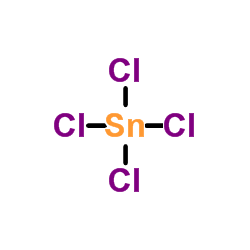二乙烯基二氯化锡 ,Divinyl tin dichloride
产品编号:Bellancom-B412004| CAS NO:7532-85-6| 分子式:C4H6Cl2Sn| 分子量:243.7064
本网站销售的所有产品仅用于工业应用或者科学研究等非医疗目的,不可用于人类或动物的临床诊断或者治疗,非药用,非食用,
| 英文名称 | Divinyl tin dichloride |
|---|---|
| CAS编号 | 7532-85-6 |
| 产品沸点 | 54ºC (3 torr) |
| 产品密度 | 1.7645 |
| 产品闪点 | 54-56°C/3mm |
| 精确质量 | 243.88700 |
| LogP | 2.35660 |
| 外观性状 | liquid | colorless |
| 稳定性 | 如果遵照规格使用和储存则不会分解。 |
| 储存条件 | 密封于阴凉干燥环境。 |
相关文档
化学品安全说明书(MSDS)
下载MSDS质检证书(COA)
相关产品
| 危险品运输编码 | UN2788 |
|---|---|
| 包装等级 | II |
| 危险类别 | 6.1 |
|
Section 1: Product Identification Chemical Name:Divinyltin dichloride, 98% CAS Registry Number:7532-85-6 Formula:(CH2=CH)2SnCl2 EINECS Number:231-399-1 Chemical Family:organotin compound Synonym:Dichlorodiethenylstannane
Section 2: Composition and Information on Ingredients IngredientCAS NumberPercentACGIH (TWA)OSHA (PEL) Title Compound7532-85-6100%0.1mg/m30.1mg/m3 Section 3: Hazards Identification Emergency Overview:Corrosive to skin, eyes and respiratory tract. Harmful if swallowed, Primary Routes of Exposure:Ingestion, inhalation, skin, eyes Eye Contact:Causes severe burns to the eyes and blindness. Skin Contact:Prolonged contact will cause redness and corrosive acid burns to the skin. Corrosive to the nose, mucous membranes and respiratory tract. High doses may cause long term Inhalation: neurological damage. Harmful if swallowed. Delayed and permanent psycho-neurologic disturbances; impairment of vision, Ingestion: unsteadiness, nausea and vomiting. Corrosive to skin, eyes and mucous membranes. Ingestion of certain organotin compounds may cause Acute Health Affects: delayed poisoning (4 days) with cerebral edema causing damage to the central nervous system. Repeated exposure to certain organic tin compounds may cause problems with vision, skin, respiratory Chronic Health Affects: system, central nervous system, liver, kidneys, urinary tract, and blood. NTP:No IARC:No OSHA:No SECTION 4: First Aid Measures Immediately flush the eyes with copious amounts of water for at least 10-15 minutes. A victim may need Eye Exposure: assistance in keeping their eye lids open. Get immediate medical attention. Wash the affected area with water. Remove contaminated clothes if necessary. Seek medical assistance if Skin Exposure: irritation persists. Remove the victim to fresh air. Closely monitor the victim for signs of respiratory problems, such as difficulty Inhalation: in breathing, coughing, wheezing, or pain. In such cases seek immediate medical assistance. Seek medical attention immediately. Keep the victim calm. Give the victim water (only if conscious). Induce Ingestion: vomiting only if directed by medical personnel. SECTION 5: Fire Fighting Measures Flash Point:no data Autoignition Temperature:no data Explosion Limits:no data Extinguishing Medium:carbon dioxide, foam or dry powder Fire fighters should be equipped with a NIOSH approved positive pressure self-contained breathing apparatus Special Fire Fighting Procedures: and full protective clothing. Hazardous Combustion andcarbon monoxide, carbon dioxide, soot, organic fumes and tin compounds. Decomposion Products: Unusual Fire or Explosion Hazards: No unusual fire or explosion hazards. SECTION 6: Accidental Release Measures Small spills can be neutralized with powdered sodium bicarbonate, lime, or calcium carbonate and swept up. Spill and Leak Procedures:Large spills in areas not adequately ventilated will require an evacuation of site. Emergency response teams will require self-contained breathing apparatus. SECTION 7: Handling and Storage Handling and Storage:Store in a cool, dry, well ventilated area away from heat and direct sunlight. Keep containers tightly sealed. SECTION 8: Exposure Controls and Personal Protection Eye Protection:Always wear approved safety glasses when handling a chemical substance in the laboratory. Skin Protection:Wear protective clothing and gloves. Consult with glove manufacturer to determine the proper type of glove. Ventilation:Work with this product in a well-ventilated area, preferably a fume hood. If ventilation is not available a respirator should be worn. The use of respirators requires a Respirator Respirator: Protection Program to be in compliance with 29 CFR 1910.134. Ventilation:Work with this product in a well-ventilated area, preferably a fume hood. Additional Protection:No additional protection required. SECTION 9: Physical and Chemical Properties Color and Form:colorless liq. Molecular Weight:243.69 Melting Point:no data Boiling Point:54-56°C /3 mm Vapor Pressure:no data Specific Gravity:no data Odor:irritating odor Solubility in Water:insoluble SECTION 10: Stability and Reactivity Stability:moisture sensitive Hazardous Polymerization:no hazardous polymerization Conditions to Avoid:none Incompatibility:strong oxidizing agents and halogens Decomposition Products:carbon monoxide, carbon dioxide, tin oxide, and organic fumes. SECTION 11: Toxicological Information Administration into the eye (rabbit); Standard Draize Test: 100ul/24H. Oral (rat); LDLo: 500mg/kg. Inhalation RTECS Data: (rat); LC: >933mg/m3/1H. Carcinogenic Effects:No data available Mutagenic Effects:No data available Tetratogenic Effects:No data available SECTION 12: Ecological Information Avoid release to groundwater or waterways. Very toxic to aquatic organisms. May cause long-term adverse Ecological Information: effects. SECTION 13: Disposal Considerations Disposal:Dispose of according to federal, state, and local regulations. SECTION 14: Transportation Shipping Name (CFR):Corrosive liquids, N.O.S. Hazard Class (CFR):8 Additional Hazard Class (CFR):NA Packaging Group (CFR):II UN ID Number (CFR):UN# 1760 Shipping Name (IATA):Corrosive liquid, N.O.S. Hazard Class (IATA):8 Additional Hazard Class (IATA):NA Packaging Group (IATA):II UN ID Number (IATA):UN# 1760 SECTION 15: Regulatory Information TSCA:Not listed in the TSCA inventory. SARA (Title 313):Title compound not listed. Second Ingredient:none SECTION 16 - ADDITIONAL INFORMATION N/A |
|
~% 
7532-85-6 |
| 文献:Journal of the American Chemical Society, , vol. 79, p. 2138 GB815954 , ; C.A., , p. 19880 US2873288 , ; C.A., , p. 13054 |
|
~% 
7532-85-6 |
| 文献:Izvestiya Akademii Nauk SSSR, Seriya Khimicheskaya, , p. 1670 - 1672 C.A., , p. 8608 |
|
~% 
7532-85-6 |
| 文献:Journal of Organometallic Chemistry, , vol. 277, # 2 p. 235 - 244 |











 浙公网安备 33010802013016号
浙公网安备 33010802013016号